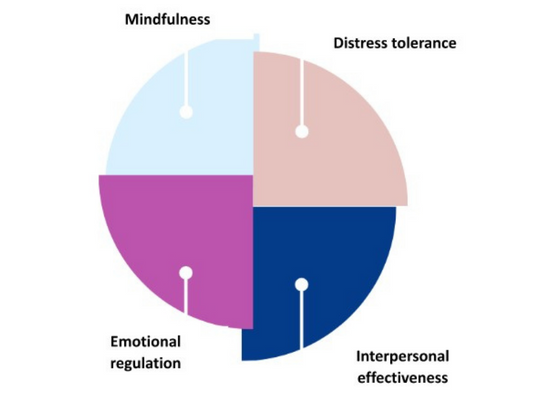Dialectical Behavioural Therapy (DBT)

Written by:
Last Updated:
March 10th, 2025
Dialectical Behavioural Therapy (DBT) is an effective mode of psychotherapy employed to treat a range of mental health conditions, including addiction. DBT for addiction encourages clients to calm their minds, express their feelings, and pursue their life goals,regardless of their history of substance dependence or behavioural reliance. Ultimately, Dialectical Behavioural Therapy for addiction can help clients to better handle triggers and any adverse emotions that come with them.
Sanctuary Lodge is proud to offer extensive DBT sessions led by our top therapists and deemed highly valuable by our previous clients. We believe DBT for addiction can help you get one step closer to long-lasting recovery.
What is DBT?
DBT is a talking therapy that Dr Marsha Linehan created in the 1970s. It is derived from a mixture of Cognitive Behavioural Therapy (CBT) and Buddhism’s teachings (due to its strong emphasis on mindfulness). Dr Linehan’s main goal was to find an effective psychotherapy treatment that blends humanism (a belief that focuses on human values and ethics), and dialectics. ‘Dialectical’ essentially means trying to understand how two or more theories that seem opposing could both be true. So, for example, accepting your flaws whilst still working on improving yourself can happen at the same time.
What is DBT for addiction?
DBT for addiction is focused on accepting the way we are, our story, and our imperfections whilst simultaneously encouraging us to work on improving ourselves and the things we can control. Clients are encouraged to accept their triggers whilst learning how to effectively change their responses to them so that they learn to react in healthier ways. Eventually, DBT for addiction can encourage clients to abstain from addictive tendencies and reduce the likelihood, length or negative impacts of relapse.
DBT for addiction is in harmony with the philosophies of other addiction treatment methods, such as the 12-step programme serenity prayer. Therefore, DBT for addiction is a vital component that mixes well with other addiction counselling methods- to give clients the best chance of recovery.
A closer look at DBT: The four skills modules
Addiction is a classified mental health disorder. So, whether it be substance dependency or behavioural reliance, the form of your addiction is just the tip of the iceberg. DBT for addiction doesn’t just work on helping clients break away from a substance; it delves further into a person’s mental and emotional state by pinpointing any subterranean attitudes, thoughts and feelings that contribute to addiction. Once these emotions have been established, DBT for addiction can offer clients alternative solutions to manage their triggers.
DBT sessions are made up of four modules: mindfulness, distress tolerance, emotional regulation and Interpersonal effectiveness.
Mindfullness
Practising mindfulness is sometimes easier said than done. Too often, our minds tend to ruminate on the past or project into the future. The purpose of mindfulness is to bring our thoughts to the present moment. For example, we can feel anger from the past without judging ourselves for feeling that anger. This may mean not trying to suppress it or blaming others for it; instead, we sit with the emotion and become aware of the here and now. Cultivating this sense of consciousness can help us identify problems before they spiral. Such mindfulness practices give us time to respond better to challenging situations.
Distress tolerance
Distress tolerance teaches us how to work through stressful situations by using cognitive behavioural techniques such as redirecting negative thoughts and steering such thoughts in a more positive and constructive direction. We know addiction can induce impulsive actions brought on by stressful circumstances, so distress tolerance teaches clients skills to manage tough circumstances more effectively. Eventually, this helps us to think rationally and exert control over our behaviours. Distress tolerances encompass many strategies, from temporary sensory distractions like drawing, painting, listening to music, walking and exercising, to constructing pros and cons lists designed to help clients consider the consequences of acting impulsively.
Emotional regulation
Humans have all learned established behaviours in response to negative scenarios or unpleasant emotions. Sometimes our responses are not serving us any good. For example, we may become so overwhelmed with emotion that we:
- Exhibit aggression
- Have outbursts
- Shut down and ignore others
- Reuse substances
- Partake in addictive behaviours
Emotional regulation teaches us how to process our emotions little by little, so we can gain control over them and thus change our reactions to them.
Unfortunately, when people are in the depths of addiction, they can feel a surplus of emotions that can be too much to let go of all at once; imagine driving a car, if we take our foot off the clutch too fast, we are likely to stall, and then the engine switches off – hence the need to release our foot slowly. Emotional regulation works the same way; by helping clients to process and release their emotions gradually and without undue pressure, so it doesn’t halt their progress towards healthier change.
Interpersonal effectiveness
In this module, you will learn skills that will help you to manage your interpersonal relationships. You can learn to identify your needs and ask confidently for the help you need. This will help you to become more assertive when saying no to addiction and the triggers that come with it, such as people, circumstances and events. It also teaches us how to handle conflict with others constructively and calmly. Interpersonal effectiveness emphasises the importance of creating boundaries across all relationships; sometimes, being too rigid or accommodating can present problems. DBT for addiction will help you establish a balance between the two as well as show you how to assert and maintain boundaries.
DBT at Sanctuary Lodge
Our rehab offers extensive DBT therapy sessions for all clients struggling with addiction. Once you have been through the admissions process, your timetable will include DBT sessions, amongst other pioneering treatments that cater to your physical, mental and emotional recovery. If you want to know more about our DBT sessions or our other addiction counselling methods, you can contact us today. A member of our team will be happy to speak with you further.
Frequently asked questions
- Skipping school or college
- Red eyes, tiredness or other changes in appearance
- Falling behind with homework or studies
- Losing interest in hobbies and activities
- Changes in mood or behaviour, such as becoming withdrawn, aggressive or anxious
- Problems with memory and concentration
- Reduced motivation
If you are worried that your son or daughter may be abusing cannabis, the best thing to do is talk to them about it. It is never too early to intervene and the sooner you address the issues, the sooner they can get help if they need it.
Disclaimer:
The availability of therapies may vary across UKAT centres. The specific therapies provided will be determined based on your treatment plan and the programme offered at your chosen facility. All treatments are subject to clinical assessment and programme availability at the time of admission. For further details on the therapies included in your treatment plan, please contact our admissions team.




